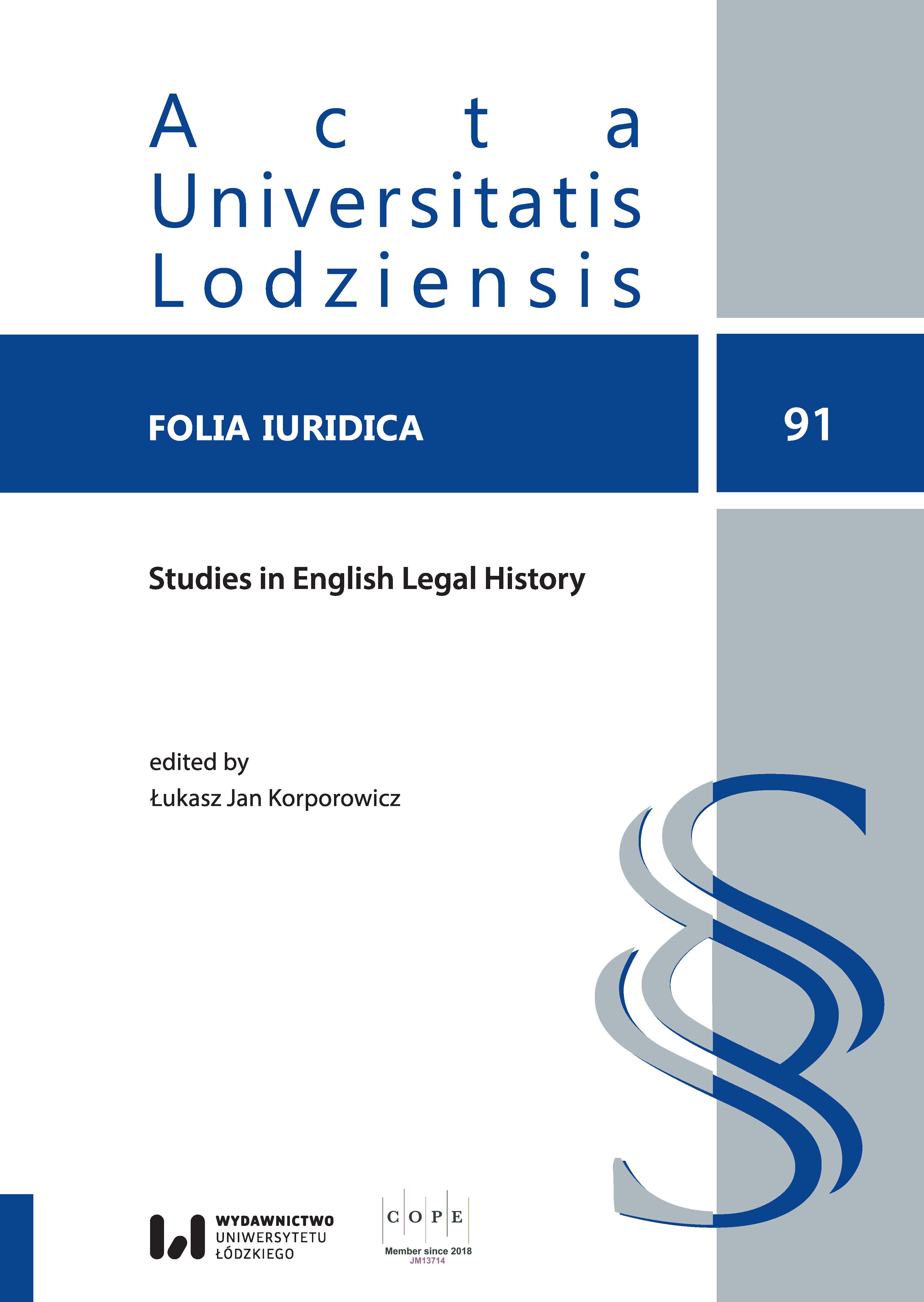Samuel Rutherford – monarchia prawa czy monarchia świętych?
DOI:
https://doi.org/10.18778/0208-6069.91.06Słowa kluczowe:
Rutherford, monarchia prawa, angielska wojna domowaAbstrakt
Samuel Rutherford – szkocki prezbiteriański pastor i myśliciel polityczny okresu angielskiej wojny domowej – uważany jest powszechnie za jednego z teoretyków koncepcji monarchii prawa, ustroju mieszanego oraz prawa oporu. Wszystkie te idee, konstytuujące nowożytny angielski konstytucjonalizm w opozycji do monarszego absolutyzmu, wywodzi z koncepcji umowy społecznej, co czyni zeń autora, do którego odwoływali się dla przykładu Ojcowie Założyciele w swym sprzeciwie wobec arbitralnej władzy metropolii. Tymczasem analiza całości jego dorobku każe poddać w wątpliwość wiele obiegowych opinii na temat autora Lex, Rex. W niniejszym artykule autor dowodzi, że hermeneutyczna analiza teologii politycznej Rutherforda skłania do wniosku, że nie był on teoretykiem monarchii prawa w jej powszechnym znaczeniu, lecz w istocie teonomicznej wizji państwa.
Pobrania
Bibliografia
Brooks, Christopher W. 2008. “The Place of Magna Carta and The Ancient Constitution in Sixteenth-Century English Legal Thought”. W: The Roots of Liberty: Magna Carta, Ancient Constitution, and the Anglo-American Tradition of Rule of Law. Pod redakcją Sandoz Elis. 75–114. Indianapolis: Liberty Found.
Google Scholar
Calvin, John. 1960. Institutes of the Christian Religion. Tłumaczenie Ford L. Battles. Louisville: Westminster John Knox Press.
Google Scholar
Campbell, William, “Lex, Rex and its author”. Records of the Scottish Church History Society 7: 204–228.
Google Scholar
Coffey, John. 1997. Politics, Religion and the British Revolutions. The Mind of Samuel Rutherford. Cambridge: Cambridge University Press.
Google Scholar
Coke, Edward. 1817. The Second Part of Institutes of the Laws of England. London: W. Clarke and Sons.
Google Scholar
Coke, Edward. 1826. The Reports of Sir Edward Coke. Vol. IV. London: Joseph Butterworth and Son.
Google Scholar
Elazar, Daniel Judah. 1995. Covenant and Polity in Biblical Israel. Biblical Foundations and Jewish Expressions. The Covenant Tradition in Politics. Vol. I. New Brunswick, New Jersey, London: Transaction Publishers.
Google Scholar
Elazar, Daniel Judah. 1996. Covenant and Commonwealth. From Christian Separation through the Protestant Reformation. The Covenant Tradition in Politics. Vol. II. New Brunswick: Transaction Publishers.
Google Scholar
Gough, John Wiedhofft. 1975. The Social Contract. A Critical Study of its Development. Oxford: Clarendon Press.
Google Scholar
Hooker, Richard. 1820. “Of the Laws of Ecclesiastical Polity”. W: The Works of Richard Hooker. Oxford: Clarendon Press.
Google Scholar
Miller, Perry. 1956. Errand into the Wilderness. Cambridge: Harvard University Press.
Google Scholar
Pocock, John Greville Agard. 1957. The Ancient Constitution and the Feudal Law. A Study of English Historical Thought in the Seventeenth Century. Cambridge, New York: Cambridge University Press.
Google Scholar
Preece, Rod. 1980. “The Anglo-Saxon Conservative Tradition”. Canadian Journal of Political Science 13 (1): 3–32.
Google Scholar
Rutherford, Samuel. 1644. The due right of presbyteries, or, A peaceable plea for the government of the Church of Scotland. London: E. Griffin.
Google Scholar
Rutherford, Samuel. 1646a. “To The Right Honorable and Noble Lord, The Earl of Lovden, Chancellor of Scotland; and Chancellor of the University of St. Andrews, Grace, Mercy and Peace”. W: Samuel Rutherford. The divine right of church-government and excommunication: or a peacable dispute for the perfection of the holy scripture in point of ceremonies and church government. London: John Field.
Google Scholar
Rutherford, Samuel. 1646b. The divine right of church-government and excommunication: or a peacable dispute for the perfection of the holy scripture in point of ceremonies and church government. London: John Field.
Google Scholar
Rutherford, Samuel. 1649. A free disputation against pretended liberty of conscience tending to resolve doubts moved by Mr. John Goodwin, John Baptist, Dr. Jer. Taylor, the Belgick Arminians, Socinians, and other authors contending for lawlesse liberty, or licentious toleration of sects and heresies. London: Andrew Crook.
Google Scholar
Rutherford, Samuel. 1655. The covenant of life opened, or, A treatise of the covenant of grace. Edinburgh: Andro Anderson.
Google Scholar
Rutherford, Samuel. 1843. Lex, Rex, or The Law and the Prince; A dispute for The Just Prerogative of King and People: containing The reasons and causes of the most necessary defensive wars of the Kingdom of Scotland, and of their Expedition for the aid and help of their dear brethren of England; in which their innocency is asserted, and a full answer is given to a seditious pamphlet, entitled, Sacro-Sancta Regnum Majestatis. Edinburgh: Robert Ogle and Oliver & Boyd.
Google Scholar
Sanderson, John. 1989. ‘But the People’s Creatures’. The philosophical basis of the English Civil War. Manchester, New York: Manchester University Press.
Google Scholar
Wolin, Sheldon. 1953. “Richard Hooker and English Conservatism”. The Western Political Quarterly 6 (1): 28–47.
Google Scholar
Pobrania
Opublikowane
Jak cytować
Numer
Dział
Licencja

Utwór dostępny jest na licencji Creative Commons Uznanie autorstwa – Użycie niekomercyjne – Bez utworów zależnych 4.0 Międzynarodowe.














